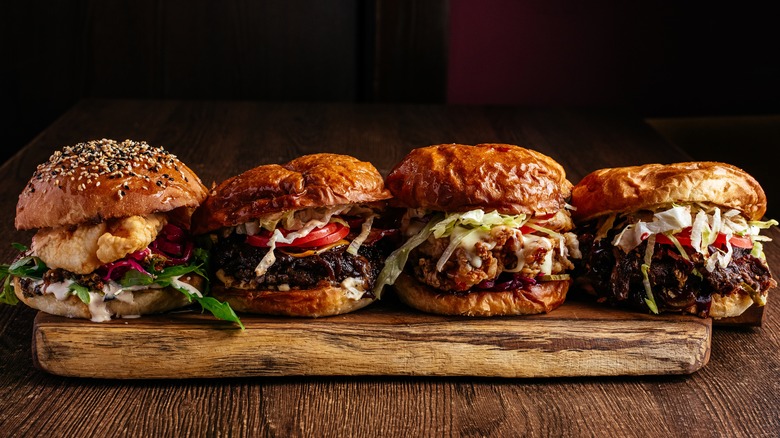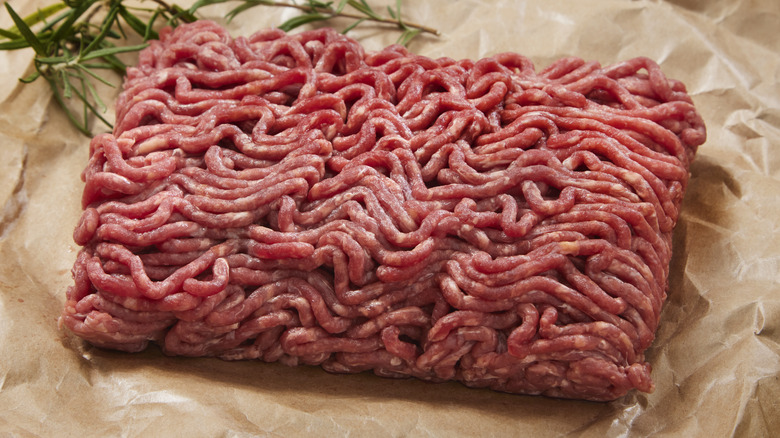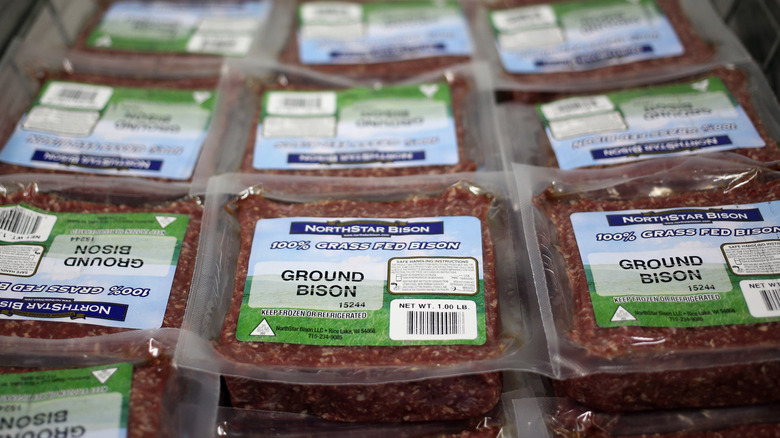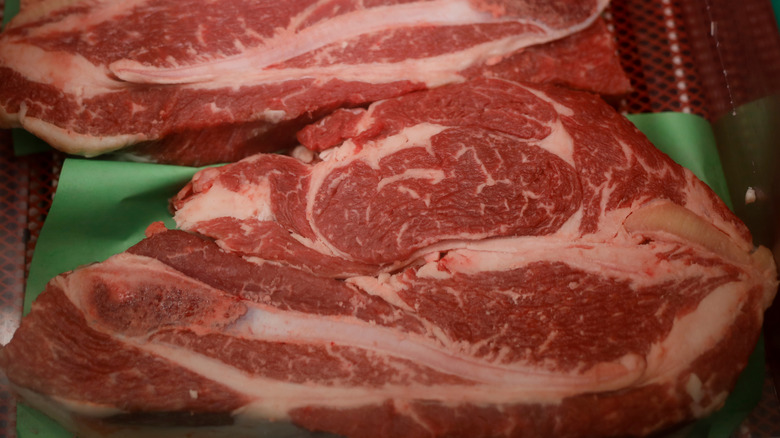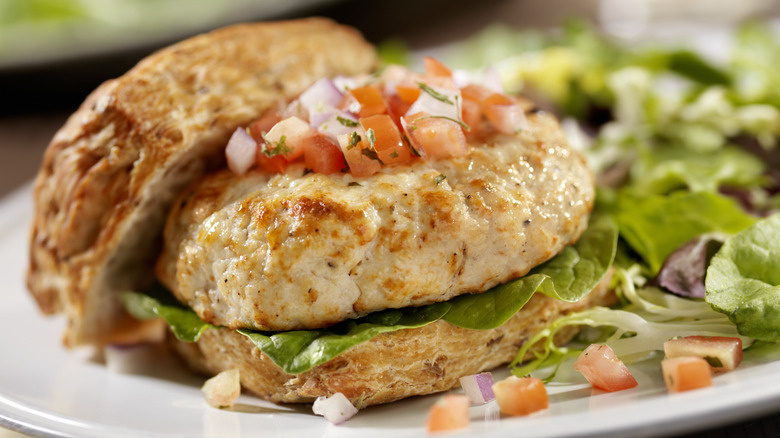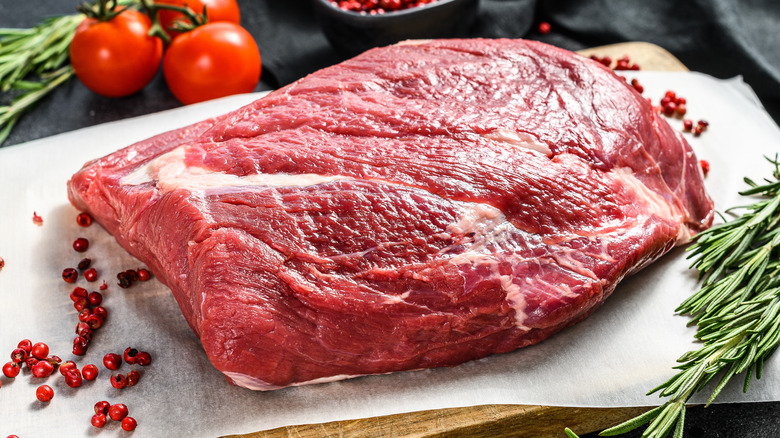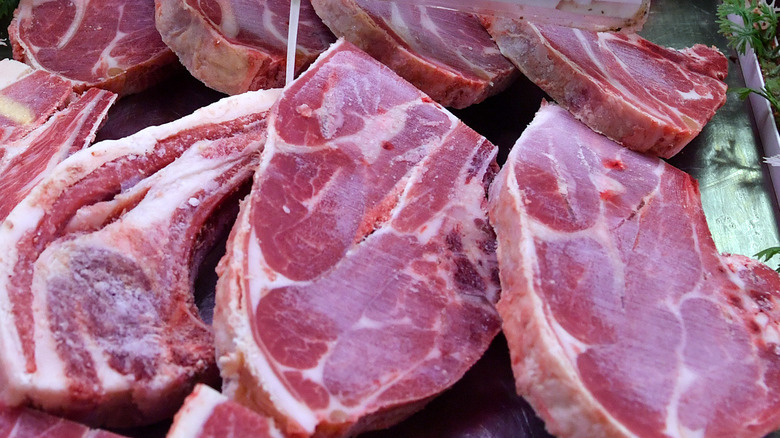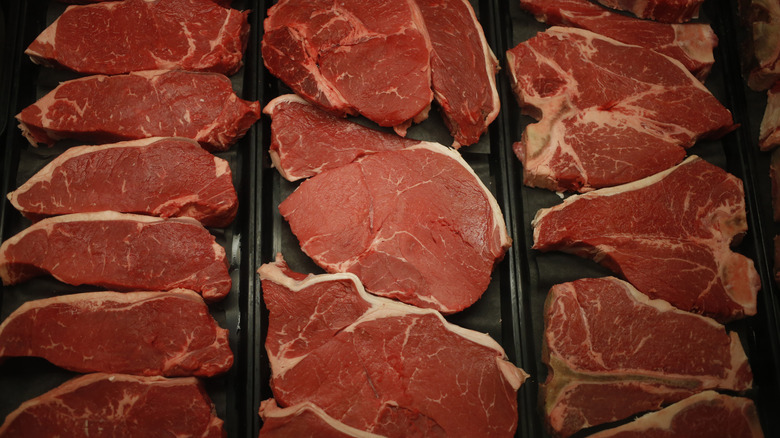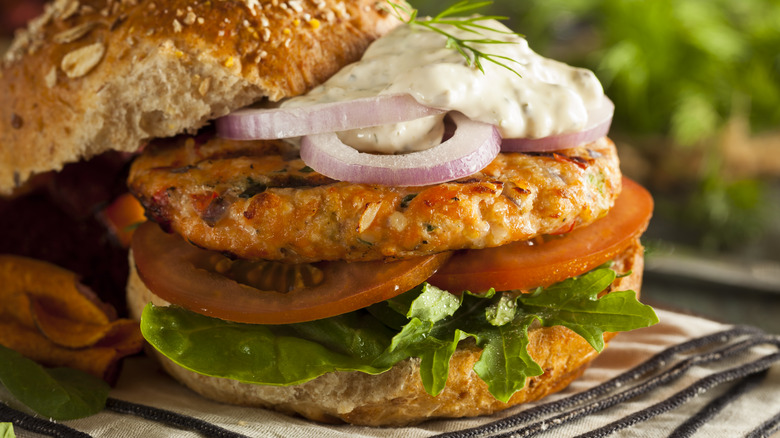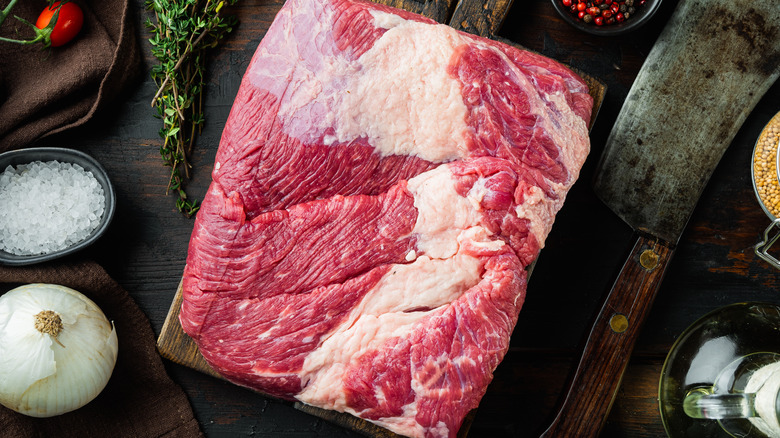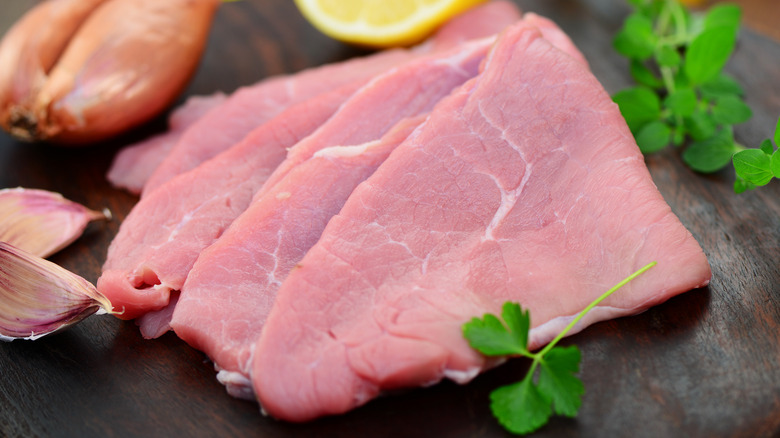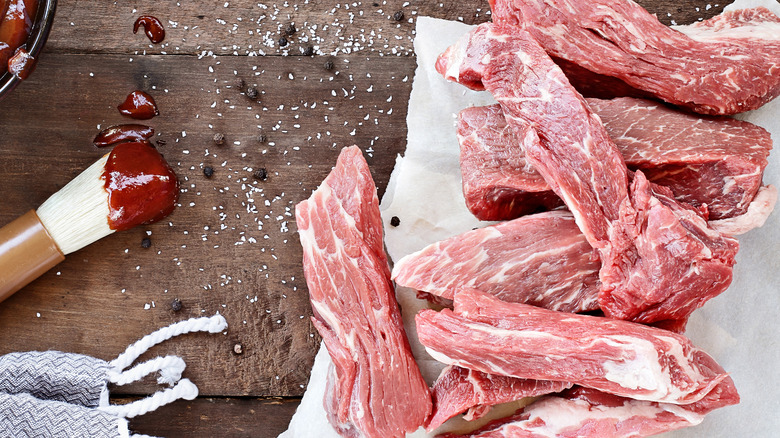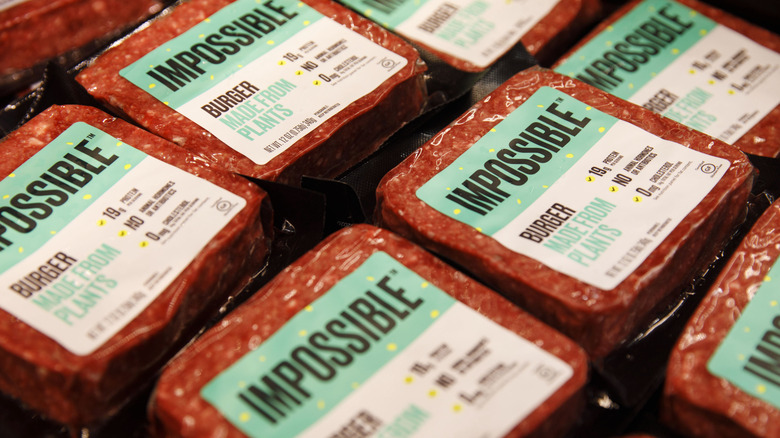The Best Meats For A Mouthwatering Burger
Any list of iconic summer foods is incomplete without the inclusion of a fresh-grilled, nicely-charred burger. But that hardly means the warmest season of the year is the only time we're eager to enjoy a delectably, juicy burger served on a fresh bun. Be it a Jimmy Buffet-style cheeseburger in paradise — with lettuce, tomato, Heinz 57, and french-fried potatoes — or a haute cuisine-level offering prepared with lamb and feta, we're never displeased (or resistant to drooling) when offered a burger.
Of course, not all burgers are created equal. Think of the insurmountable gap between a fancy pub's hand-crafted Angus cheeseburger (topped with fresh Cabot cheddar, perhaps?), and a cheaply-constructed, low-quality patty that's grilled until it's a literal hockey puck. In that sense, nothing may be more crucial to crafting a successful burger — one that's guaranteed to get your mouth watering before it hits the plate — than which meat you choose to use.
Now, we're sure many readers would instinctively (and fairly) shout "beef!" when asked which meat makes the best burger. But if you aren't considering any options beyond a generically-labeled product made from butchered cow protein, you're undoubtedly missing out. Along those lines, we've gathered a list of the best meats available for creating an utterly appetizing (and potentially eye-popping) final product. Without further ado, here are the best meats for a mouthwatering burger.
Ground beef
Before we discuss any non-cow-derived options one should consider, let's get the ball rolling with arguably the most popular burger meat on the market: ground beef. This generic selection is comprised of various, imprecise beef trimmings remaining at the slaughterhouse after butchering a cow. And while there are other, more specific cuts of beef at your disposal when making a burger, we simply couldn't ignore the simply labeled "ground beef" version when assembling this list.
There are several reasons why a nonspecific ground beef package will almost automatically lead you to an exceptionally tasty burger. For one thing, meat labeled as such tends to have a higher fat content than less generic selections, with a lean-to-fat ratio ranging as high as 70/30 in such varieties. This high-fat level may not be good for your health, of course, but it certainly produces a flavorful burger no matter your preferred cooking method.
Additionally, since generic ground beef products tend to be cheaper than alternative meat options, it can satisfy both your palate and wallet. It may not be as glamorous as other, yet-to-be-mentioned choices you could use when making a burger — but we can promise ground beef will make your mouth water every time you utilize it.
Bison
The prominence of beef in burger recipes is wholly justified. But the incomparably glorious flavor found from beef formed into a patty does little to ameliorate the fairly unhealthy nature of cow-based proteins. So, if you want to maintain the savory, beefy succulence you've come to love in your next burger while avoiding a nutritional nightmare, don't hesitate to add bison to your shopping list.
It's sort of simple to explain why so many people consider bison meat to be the lean version of beef. We won't argue it's an exact, perfect match flavor-wise, of course, since we're talking about two entirely different animals. But the two red meat varieties do taste stunningly similar. According to Healthline, bison meat contains 25% fewer calories than beef, and 8 grams of fat per 4-ounce serving (compared to 14 grams in beef) – meaning bison's reputation as a genuinely healthy version of beef is well-earned.
Of course, whether it's bison or beef, the fact remains many diet plans recommend you limit your overall intake of red meat to prevent diabetes and heart disease (via The Lancet). Still, whenever you do decide to fulfill your desire to craft a top-notch, beef-like burger? Give bison meat a chance (and keep in mind a leaner meat leads to a quicker-cooking burger).
Chuck (beef)
As we noted earlier, when we say "ground beef," we're referring to a singular high-fat variety made with unspecified beef trimmings. There are a number of additional, specific cuts of beef you can use to make a phenomenal burger. That list includes what may be the closest comparison to generic ground beef in chuck, a high-fat option made exclusively with cuts from the chuck primal (taken from the shoulder area of a cow).
Now, while chuck is far less mysterious than straightforward ground beef in regards to its origin, its lofty fat level ensures it's not too dissimilar to its more commonly labeled cousin once it's cooked and eaten. Chuck contains a lean-to-fat ratio around 80/20 – providing a slightly less nutritionally detrimental profile compared to ground beef's 70/30 ratio, while retaining enough fat to result in a delightfully juicy and mouthwatering burger.
Given the preferred fat content for a beef-based burger should measure between 15% and 20%, it's obvious why chuck's composition is ideal for this classic food item. It's not your only option, of course, but it's an always reliable ingredient you can incorporate into any burger recipe.
Turkey
Outside of beef, turkey meat could be the most popular burger option throughout the U.S. But given the infuriating tendency for ground turkey to become a dried-out disaster when used as a burger substitute, it may concurrently be the most controversial of all widely accepted burger meat options, as well. Of course, as long as you prepare for this overcooking risk — and remember that turkey is not actually beef when eating it — there's no reason you can't produce an awesome burger with this poultry.
Interestingly enough, despite turkey being a healthier option with a lower fat content than beef (via Healthline), one of the easiest ways to ensure turkey burgers stay moist during the cooking process is by adding fat to the meat. This clearly doesn't mean you should scoop Crisco onto your turkey burger patties while cooking — but adding a little olive oil when mixing can go a long way.
Once upon a time on "Parks and Recreation," Ron Swanson sagely told Chris Traegor, "Turkey can never beat cow." Yet seeing how this isn't a competition between burger meat choices, it doesn't have to — and if you'd like a poultry-based alternative, the right turkey burger can satiate any craving.
Round (beef)
We haven't been shy about the fact that a number of different, unique beef cuts are deserving of potential usage in a burger — and we're not close to done yet. Now, round — the next type of beef we're highlighting — is actually comparable to both ground beef and ground chuck. In fact, with a lean-to-fat ratio closer to 85/15 (than chuck's 80/20 average), round makes for a slightly leaner burger than chuck without sacrificing much of the classic beefy flavor you'd expect.
Taken from the round primal area of the cow, we don't mean to imply round is an exorbitantly lean cut of meat by any stretch. It's certainly more prone to overcooking (and drying out in the process) than its higher-fat cousin in chuck. But the inherent risk of dry meat with leaner cuts simply means you'll need to pay more attention during the cooking process — and may want to be a bit more thoughtful when prepping the patties beforehand. Round is a great option for making slightly-less fatty burgers without having to worry you'll break the bank. You'll always end up a member of the clean plate club when serving a burger made with round — and isn't that the entire point?
Lamb
There's one question we've never been able to answer: did Mary's little lamb taste as pristine as the baby sheep's snow-white fleece implied? We'd like to think so. Of course, if our query regarding the ultimate fate of Mary's pet farm animal seems unnecessarily macabre, well ... we simply can't apologize for the fact we love lamb meat as a culinary ingredient. With that in mind, we'd like to honor the memory of that famous nursery rhyme character with our next meat selection; and think you should grab a pack of lamb the next time you're looking to make a mouthwatering burger.
We'd imagine some readers assume the ideal (and perhaps only) way to cook and serve a lamb burger is by pairing it with traditional Greek flavors — and to be sure, there's no shortage of delectable Greek-style recipes for your culinary enjoyment. Yet we'd encourage you to consider more than just crumbled feta cheese and marinated olives on your lamb burger, as there's a plethora of intriguing options beyond the classic Mediterranean flavors. Anyone interested in personally pulverizing chunks of lamb meat with your own meat grinder can choose from a number of cuts, including leg of lamb and shoulder. But we've never had any issues with pre-ground lamb, so don't hesitate to purchase that style of meat, either.
Sirloin (beef)
Once again, we return to meat taken from the not-so-humble cow — as well as the final beef cut typically sold in pre-ground form at grocery stores. That's not to say sirloin — the leanest of all standard, pre-ground beef options with an average 90/10 lean-to-fat ratio — is only suitable for burgers if it's already minced upon purchase. Since sirloin is widely sold as steaks, as well, you'll be just as pleased if you choose intact pieces to toss into the meat grinder in your kitchen.
For any home chefs eager to make use of their meat grinder, it's best to go with more visibly fatty cuts from the supermarket. If this seems counterintuitive — part of sirloin's appeal as a burger option is its leaner (and therefore healthier) makeup compared to ground beef, chuck, and round — don't overthink it. Sirloin in any variety is still a lower fat option than previously listed beef alternatives, after all (though that very aspect causes some to skip this type when making burgers). One additional consideration with sirloin is its slightly higher cost since generally speaking, the leaner (and more tender) a cut of beef, the more expensive it will be. In other words, your mouth will end up watering, but your wallet may end up in pain.
Salmon
We'd be willing to bet that in the eyes of John and Jane Q. Public, only meats belonging to the extended beef family are capable of delivering the goods burger-wise. Now, to be perfectly honest, we're not looking to refute minced cow muscle's supremacy in the burger meat clubhouse. But we are eager to expand the burger-centric horizons for any interested diners. So, even if the notion of using seafood to form a burger patty sounds fishy to you, don't be afraid to buck tradition, and utilize salmon the next time you make burgers.
We recognize it's impossible to discuss this potential meat option without addressing the inherently bizarre nature of a fish-based burger. Then again, with the general evolution through the years of what a burger actually is (and what it can be made with) in recipes and on restaurant menus, it's foolish to restrict yourself when it comes to new or unusual culinary creations. The debate regarding this fish meat's use in burgers isn't apt to end anytime soon. Still, if you remain unsure about salmon's mouthwatering capabilities, remember: you're not a soothsayer — and you just might end up loving a salmon burger (particularly one topped with spicy mayo).
Brisket (beef)
Some may be surprised to see brisket (by which we mean beef brisket) recommended as a worthwhile burger meat option. But if you're the type who thinks brisket is only amenable to slow cooker recipes, you're depriving your taste buds of tip-top burger meat in the process. In fact, while a whole beef brisket may require a low and slow cooking time, that concern is largely alleviated after mincing meat — and who doesn't want that toothsome flavor in a burger patty?
Now, since beef brisket isn't generally sold as ground meat at supermarkets, you'll likely need to make use of a meat grinder, or ask the butcher to do it for you while in the store. With that in mind, consider looking for leaner cuts of brisket when making your selection for burgers. Quite frankly, because of the high-fat content inherent to brisket, the risk of ending up with an extremely high lean-to-fat ratio shouldn't be ignored. Then again, since a high-fat brisket burger will be an undeniably memorable experience, that may not be the worst thing in the world.
Veal
To any readers completely opposed to the production, sale, use, and consumption of veal for moral reasons: we respect your position, and implore you to skip to the next slide. However, since it's our responsibility to include every high-quality meat option available to modern-day consumers when making burgers, we feel a slide dedicated to veal is imperative to that mission.
Now, it may seem sort of obvious why veal meat is an exceptional item to form into a patty, cook, then eat as a burger. To the uninformed, veal may be viewed as little more than a supremely tender, melt-in-your-mouth version of beef — being the product of a calf (aka a young cow), after all. Yet the (largely indefensible) manner in which calves are raised once they're pegged for veal production ensures it tastes far more subtle than what one expects from a fully-matured cow.
Regardless of the meat's overall flavor profile, the potential for a veal burger to make one's mouth water is heavily dependent on the ability to stomach the meat's traditional production practices. In that regard, if an animal's treatment before slaughter doesn't faze you, don't leave ground veal in the meat department when searching for burger ingredients.
Boneless short rib (beef)
If we haven't made it clear, the incredible flavor found in certain cuts of beef isn't lost once those whole pieces are ground up in a meat grinder. In fact, if you've got a particular fondness for the succulent beefy delight of fork-tender boneless short ribs, we've got some good news for you: this meat translates transcendently when used to make burgers.
There are plenty of well-regarded culinary craftspeople who recognize boneless short rib's ability to elevate the dining experience of any burger. Boneless short ribs contain an ideal level of fat for producing a fantastic burger, after all, with the meat's incredibly tender nature resulting in an immensely pleasurable series of bites.
You may need to put in a bit more effort to make use of boneless short ribs compared to generic ground beef. Then again, if you can view any elbow grease required to create and cook burgers made with this beef cut as part of the journey, you'll never be disappointed in the destination (i.e. a mouthwatering burger).
Impossible meat
Any readers flying into an uproar over our decision to include plant-based meat on this list — whether it's made by Impossible Foods, Beyond Meat, or any other purveyor of non-animal-derived meat products — should do two things. First, take a deep breath, and remember this article isn't a life-or-death endeavor (it's a guide to burger meat). Secondly, consider the fact that plant-based meat more than meets our criteria for inclusion.
Indeed, since many plant-based meat brands choose to self-identify its products as meat, we're inclined to include this category among the best meats for a mouthwatering burger. Quite frankly, we'd be neglecting the very purpose of this article if we chose to shun any veggie-derived meats on some sort of misguided principle. Plus, it's impossible to dispute the fact that many plant-based meat items taste nearly identical to actual animal-based meats — meaning there's no taste-centric reason to withhold this type of meat from our list, either.
Perhaps the world's obsession with lab-created meats (those composed of vegan-approved ingredients) has waned a bit as of August 2023. But seeing how this "meat" is technically meat for our purposes, we believe it's more than worthy of consideration for your next scratch-made burger night.
